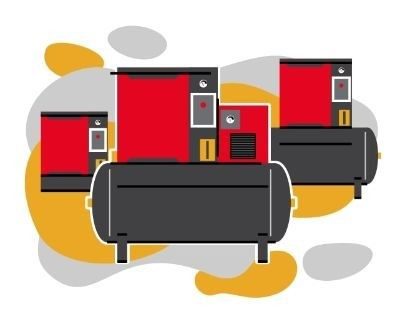Proportioning the Compressed Air Dryer
Trying to figure out which air dryer capacity is best for you? Here are some factors to consider. Read More…
 Establishing
a Leak Prevention Plan
Establishing
a Leak Prevention Plan
Air compressor leaks can be a substantial source of wasted energy in any system, sometimes wasting 20-30% of a compressor's production.
Worst of all, a poorly maintained compressor can have a leak rate expected to equal 20% of total compressed air production capacity. A
compressor leak produces a drop in the systems pressure, which causes tools to operate less efficiently, run longer, and shortens the life
span of that tool. Increased run-time adds more strain to the system and can lead to additional maintenance and unscheduled downtime.
A leak repair program is critical in maintaining the efficiency, reliability and cost effectiveness of any compressed air system. Below are a few steps to implement a program in your shop.
1. Leak Identifications: Your operation should establish a program to find and reduce leaks. This can be as simple as walking the facility during a non-production period and addressing the audible leaks, using a solution of soap and water to visibly identify leaks, or by using an ultrasonic leak detector to more accurately identify the source of an air leak and to detect the inaudible leaks.
2. Seek, tag & repair the leak: Now that you've located the leaks and "tagged" them, schedule them to be repaired. Once repaired, make sure you run an audit to ensure the leak has been patched and operations are running efficiently. Documented leak repair program is insightful on finding root causes of leakages, and where leaks occur frequently and which component fails fast.
3. Employee Education: One method of reducing air leaks or inappropriate uses of compressed air is employee
education. Educate your employees about how much a leak can cost the company. Some facilities have even adopted programs rewarding
employees for reporting air leaks or reducing compressed air demand for their departments. Air leaks and inefficient compressed air
uses will continue to develop so it is important to recognize they should also be addressed regularly. A leak prevention program should be
part of an overall program aimed at improving the performance of compressed air systems.
Ash Air has been around in New Zealand since 1979, and we’ve grown into a nationwide company with international support and a reputation for quality and reliability.We look after all things compressed air for your business!
Ash Air's range of Chicago Pneumatic, Alup, Pneumatech, and Quincy compressors are used extensively around the world in industries ranging from oil and gas to food, automotive and farming, and we bring you these world class compressors here in the land of the long white cloud.Our technicians are compressed air equipment experts and are dedicated to addressing customer needs. Supported by a 13 locations nationwide, Ash Air offers one of the widest selections of compressed air equipment and parts available today in New Zealand.
With Ash Air compressors, you can count on reliability and high performance for even the most demanding applications. We focus our efforts on the following:
Talk to the team today:
Proportioning the Compressed Air Dryer
Trying to figure out which air dryer capacity is best for you? Here are some factors to consider. Read More…
Maintenance budget: 8 factors to consider
Just like any other equipment, a compressed air installation also requires the necessary maintenance work during its entire lifespan. Even though maintenance costs are only about 5 to 10% of a machine's annual operating costs, failure to budget for maintenance can have potentially disastrous consequences. Read More…
The air dyer is one of the most ignored cooler in the system. A dirty condenser will cause water in the lines, or worse it will cause complete dryer failure. Read More…
Why Replace CO2 with Nitrogen in your Brewery
Using nitrogen is not about fully replacing CO2, but it can reduce their consumption of CO2 by close to 70%. Using nitrogen is about sustainability. Creating your own nitrogen is easy and will reduce the use of a greenhouse gas, which is better for the environment. It will also save you money as early as month one adding that savings to your bottom line. Read More…
What do I need to know about ICONS?
ICONS: Intelligent Connectivity System: The insight into your compressed air system, wherever you are. Learn More about ICONS in this article here! Read More…
A question that is occasionally asked by our customers to Ash Air is 'what is the cost of compressed air?' This article looks at the product costs involved with compressed air, as well as minimising the energy cost of compressors and cost allocation. When looking at these factors, we need to realise what causes dropped efficiency of your compressor, leading to increased costs of compressed air. Read More…